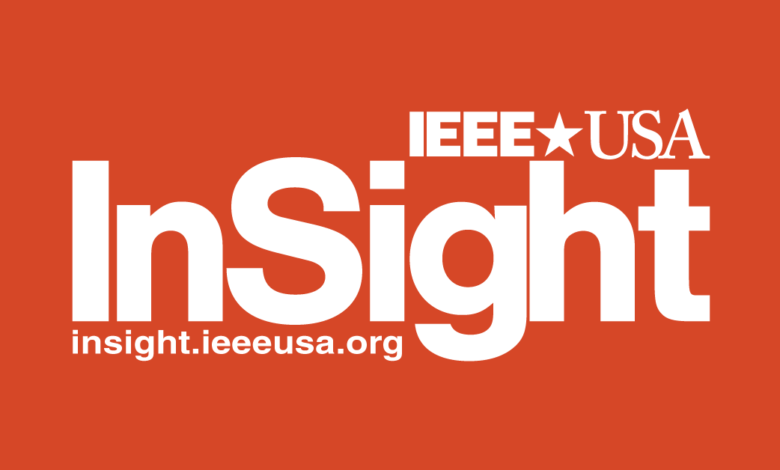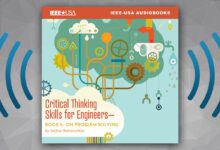
Michael McQuade, an IEEE member for 42 years, Len Hause, an IEEE member for 35 years, and Anne Marie Lewis, an IEEE member for one year, were selected as IEEE-USA’s 2013-2014 Government Fellows. They traveled to Washington in September, to begin a year of learning firsthand about federal policymaking, by serving as advisers to the U.S. Congress or U.S. Department of State decision-makers. Known as a Congressional Fellowship or an Engineering & Diplomacy (State Department) Fellowship, the program’s goal is to provide a mechanism for IEEE’s U.S. members to learn about the public policy process, while imparting their knowledge and experience to policymakers.
Anne Marie Lewis, an IEEE-USA Congressional Fellow, recently received her Ph.D. in mechanical engineering, and natural resources and environment, from the University of Michigan. For her dissertation research, she assessed the potential of advanced combustion engines and lightweight materials to reduce life cycle energy and greenhouse gas emissions. Lewis founded the Michigan Energy Club at the university to provide an interdisciplinary forum to learn about energy topics from a variety of perspectives. She applied for the fellowship because she thinks it is essential that scientists take an active role in informing science-related policy.
“It seems like there is a great need for people who can provide a science-based explanation of the pros and cons of certain policy decisions, especially now, as our nation faces many difficult decisions regarding energy and the environment,” said Lewis. “As a Congressional Fellow, I will act as a translator between scientists and policymakers by synthesizing complicated issues to the appropriate level so that informed decisions can be made.”
Lewis became interested in the program in 2010, when she interned in Washington at the Alliance of Automobile Manufacturers; her supervisor, a former fellow, encouraged her to apply for the fellowship. That internship, and one with the Michigan League of Conservation Voters, was instrumental in preparing her to work with policymakers.
“During my internship at the Alliance, I conducted informational interviews with other professionals in the science policy field, and learned that the AAAS fellowship is a key way that many scientists are able to successfully make the transition from research to science policy,” said Lewis.
Lewis received her bachelor’s degree in mechanical engineering from Carnegie Mellon University in 2008, and her master’s degree in mechanical engineering from the University of Michigan in 2011. When not in school, Lewis enjoys running, playing the piano, traveling, cooking new food, and spending time with friends and family.
Michael McQuade, an IEEE-USA Congressional Fellow, joined IEEE when he was an undergraduate student in electrical engineering at the University of Missouri. He learned about IEEE-USA’s government fellowships years ago, when one of his team members on an ABET accreditation campus visit was a former Congressional Fellow, and spoke highly of the program. But he didn’t apply until this year, after spending two years as a member of the writing team for Next Generation Science Standards, a National Research Council initiative addressing K-12 science, technology, engineering and math (STEM) pipeline issues.
“I enjoyed my experience developing the Next Generation Science Standards, and changed my opinion that no one person can make a difference in a large arena,” said McQuade. “I thought I could provide explanations of technology issues in a manner understandable to the non-technically educated member of Congress.”
In August, McQuade retired from the DuPont Co., in Wilmington, Del., where he was a senior research associate who focused on renewable energy. McQuade spent five years, on behalf of DuPont, as a guest scientist at the Los Alamos National Laboratory before taking an overseas assignment in Luxembourg. In addition to being a registered professional engineer, he has held adjunct teaching positions at Widener University, Drexel University and the University of New Mexico. McQuade is currently an IEEE commissioner on ABET’s engineering accreditation commission, and serves as a technical advisor to FIRST. He received his master’s degree in electrical engineering from the University of Missouri, and his Ph.D. in electrical and computer engineering from the Georgia Institute of Technology.
“This fellowship provides a good opportunity to end a 30-plus year career on a high note, and perhaps find another interesting path to follow in retirement,” added McQuade.
When not working, McQuade and his wife enjoy taking short bicycle tours, attending local festivals and visiting national parks (they’ve visited almost 300!).
McQuade and Lewis interviewed with several congressional offices following orientation in September and selected their placement.
Len Hause, IEEE-USA’s State Department Fellow, began his fellowship in September at the U.S. State Department in the Office of the Coordinator for Cyber Issues. This office is responsible for coordinating the State Department’s global diplomatic engagement on cyber issues, including security, economic issues, freedom of expression, and free flow of information on the Internet.
“There are obviously a lot of issues and opportunities related to the Internet, and I am excited to play a role in advising our leaders to the benefit of the United States and the global community,” said Hause.
Prior to the fellowship, Hause served as president of MashBrain LLC, where he consulted on transformational strategies that leverage Internet technology and marketing. Before that, he spent more than 30 years at Motorola, serving as a Fellow of the Technical Staff, associate of the Science Advisory Board, internetologist, and senior marketing director. Hause earned his bachelor’s degree in electrical engineering from Lehigh University.
Hause learned of the fellowship while participating in an IEEE-USA Congressional Visits Day.
“I discovered that many of the issues I encountered with my consulting business-Internet governance, Smart Grid, STEM education, privacy/security and broadband-had significant overlap with public policy decisions. It was also clear that there was a shortage of people who could understand and communicate the technological and commercial aspects of these issues in Washington,” said Hause.
While in Washington, Hause hopes to find people who can “feed his musical spirit.” Coming from Austin, Texas, Hause has played music and performed with amazing musicians–and hopes to do the same in the Nation’s capital.
Abby Robinson is an IEEE Senior Member and freelance writer, based in the Washington, D.C. area.






